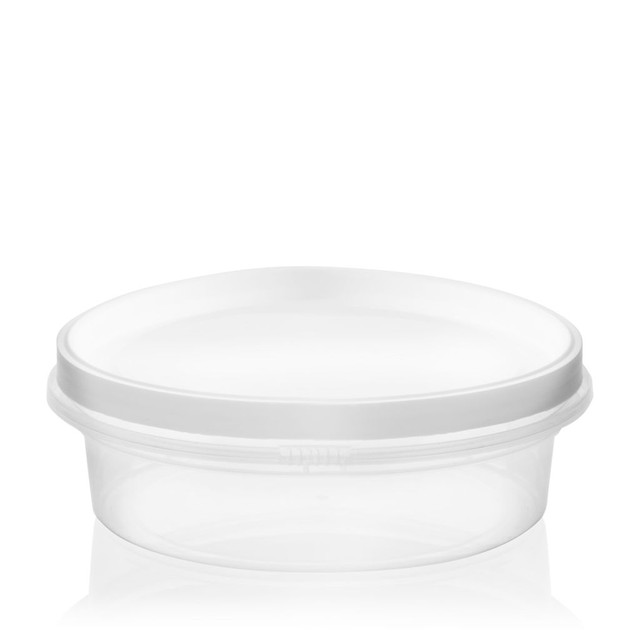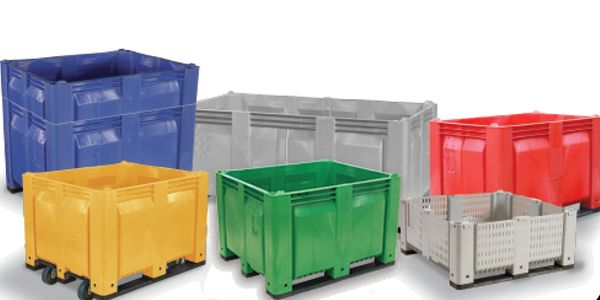A Comprehensive Overview to the Various Kinds of Mass Plastic Containers Available Today
Bulk plastic containers play a vital function in different markets, using remedies for storage and transportation. Their varied types accommodate different requirements, from rigid options for strong products to flexible containers accommodating numerous forms. Each kind provides distinct benefits, making it vital to understand their applications and features. As sectors advance, so do the needs for effective container services. What variables should one consider when choosing the ideal mass container?
Review of Mass Plastic Containers

Types of Bulk Plastic Containers
Mass plastic containers can be found in numerous types, each fit to details applications. Inflexible bulk containers, adaptable bulk containers, and intermediate mass containers stand for the key classifications, each offering special benefits. Recognizing these kinds is necessary for picking the right container for carrying and keeping materials.

Inflexible Mass Containers
Stiff bulk containers are important for effective storage and transportation of various materials across industries. These containers are typically created from sturdy plastics, permitting them to withstand extreme handling and environmental conditions. They can be found in various sizes and shapes, including drums, totes, and bins, making them suitable for keeping everything from granular compounds to fluids. Rigid containers often feature enhanced wall surfaces and safe and secure lids, making certain the components remain shielded throughout transportation. Their stackable layout optimizes storage area, making them ideal for storage facilities and making facilities. In addition, lots of stiff bulk containers are recyclable and multiple-use, adding to sustainability initiatives. In general, their robustness and versatility make inflexible mass containers an essential part in supply chain procedures.
Versatile Bulk Containers
Adaptable bulk containers, often described as versatile intermediate bulk containers (FIBCs), serve as a flexible service for delivering and storing a range of dry materials. These containers are normally made from woven polypropylene and are created to be lightweight yet solid, enabling reliable handling and stacking. Their adaptability enables them to fit numerous shapes and sizes, making them ideal for items ranging from grains to chemicals. FIBCs can be geared up with attributes such as spouts for easy filling and discharge, in addition to safety coatings for boosted toughness. In addition, they are recyclable and recyclable, adding to lasting practices in industries like agriculture, food handling, and building. In general, flexible mass containers supply a cost-efficient and reliable alternative for bulk product management.
Intermediate Bulk Containers
Intermediate bulk containers (IBCs) are vital for the effective transportation and storage space of fluids and granular materials across different markets. These containers commonly have a capacity varying from 275 to 330 gallons and are made for very easy handling and stacking. Made from resilient products like high-density polyethylene or steel, IBCs offer outstanding protection against contamination and ecological factors. Their layout includes attributes such as a built-in pallet for forklift access and a removable top for very easy dental filling and cleaning. IBCs are extensively utilized in chemical, food, and pharmaceutical sectors, ensuring conformity with safety and security regulations. Their versatility and reusability make them an affordable service for mass storage space and transport, adding to provide chain effectiveness and sustainability.
Functions and Benefits of Bulk Plastic Containers
Mass plastic containers are crucial devices in different industries, supplying a mix of durability and usefulness. These containers are created from top notch materials, making them immune to effects, chemicals, and environmental elements. This effectiveness warranties item security during storage space and transport.
In addition, mass plastic containers are lightweight, facilitating simplicity of reducing and managing shipping expenses. Their stackable design makes the most of storage space effectiveness, enabling maximized warehouse space. Lots of designs include protected covers or closures, supplying a closed seal that stops and maintains contents contamination.
Mass plastic containers are recyclable and frequently recyclable, contributing to lasting methods. Their adaptability permits for a vast array of applications, from food storage space to commercial use, improving their worth throughout fields. Businesses profit from the lengthy lifespan and reduced maintenance needs of these containers, making them an affordable remedy for both temporary and lasting needs.
Industries That Utilize Bulk Plastic Containers
Different markets benefit from the use of mass plastic containers, each leveraging their one-of-a-kind homes for certain applications. The food and drink sector counts on these containers for safe storage and transportation of products, while the chemical manufacturing sector uses them for taking care of dangerous products. Furthermore, the pharmaceutical distribution requires highlight the significance of sturdiness and cleanliness in packaging solutions.
Food and Beverage Sector
As the demand for reliable and risk-free storage remedies remains to climb, the food and beverage industry significantly relies upon mass plastic containers for their functional demands. These containers supply robust, lightweight, and versatile alternatives for saving components, ended up products, and waste products. Made from food-grade materials, they assure conformity with health and wellness standards. Numerous designs, such as stackable containers and carry boxes, enhance room during transportation and storage space, improving logistical performance. In addition, the openness of some bulk containers permits very easy inventory monitoring, reducing the threat of wasting. With the industry's concentrate on sustainability, many suppliers are now using reusable and recyclable choices, aligning with eco-friendly practices while satisfying the high needs of food security and hygiene.
Chemical Production Industry
The chemical production field depends greatly on mass plastic containers for the safe and effective storage of raw materials, intermediates, and finished products. These containers are created to endure various chemicals, making certain that hazardous materials do not leakage or weaken the container itself. Typical kinds consist of high-density polyethylene (HDPE) and polypropylene containers, which supply superb chemical resistance and toughness. Their light-weight nature and stackable style promote transport and storage space, maximizing area in producing facilities. In addition, several mass plastic containers include attributes such as tamper-evident seals and easy-to-read labeling, boosting safety and security and conformity with market laws. In general, bulk plastic containers are essential to the chemical production process, providing reliable remedies for handling varied compounds.
Pharmaceutical Distribution Demands
Pharmaceutical distribution counts on mass plastic containers to meet stringent safety and regulatory needs. These containers are crucial for storing a variety and transferring of pharmaceutical products, consisting of active pharmaceutical components (APIs) and completed drugs. Their layout warranties defense versus light, contamination, and dampness, keeping the stability of delicate materials. Additionally, mass plastic containers are compliant with sector criteria such as Great Manufacturing Practices (GMP) and are usually made from products that are FDA-approved. The use of these containers boosts effectiveness in the supply chain, enabling secure, large distribution while decreasing waste. Business in the pharmaceutical sector prioritize making use of long lasting, watertight, and tamper-evident containers to ensure item security and top quality throughout the logistics process.
Considerations for Selecting the Right Container
When selecting the suitable mass plastic container, numerous aspects should be meticulously evaluated to guarantee optimal functionality and security. The nature of the products to be kept is extremely important; compatibility with the container's product can influence stability and security. plastic bulk containers. Furthermore, the container's size and shape have to line up with the storage space and transport requirements, assuring effective area utilization
Tons capability is one more important factor to consider, as it must accommodate the weight of materials without threat of damage or informative post failing. The design functions, such as airing vent or lids, can influence use and gain access to. Conformity with sector regulations is vital, specifically in fields like drugs, where security criteria are rigorous.
Finally, the expected life expectancy and longevity of the container ought to be examined to verify it meets the functional requirements without regular replacement. By reviewing these variables, one can select one of the most suitable mass plastic container for details applications.
Ecological Effect and Sustainability
As companies progressively prioritize sustainability, the environmental influence of mass plastic containers has come under scrutiny. These containers, frequently made from materials such as polyethylene or polypropylene, contribute greatly to plastic waste if not managed effectively. Their manufacturing entails the consumption of nonrenewable fuel sources, which can cause boosted greenhouse gas discharges. Improvements in reusing innovation and the development of biodegradable choices are assisting to reduce these concerns.
why not find out more Moreover, many manufacturers are taking on methods that highlight making use of recycled products, consequently reducing the demand for virgin plastics. The durability of bulk plastic containers also plays a duty; they are created to be reused numerous times, which can reduce their total ecological footprint when contrasted to single-use options. Eventually, the industry deals with the obstacle of balancing capability with eco-friendly obligation, making lasting practices crucial for the future of bulk plastic containers.
Ideal Practices for Storage Space and Transport
Reliable storage space and transport of bulk plastic containers considerably affect both functional efficiency and sustainability. To make the most of area, organizations must stack containers firmly, guaranteeing stability and avoiding damages. Correct labeling is important for easy identification, which streamlines retrieval procedures. In addition, maintaining a clean and orderly storage space location lowers the risk of contamination and enhances safety.
For transport, picking the ideal automobile is important; containers should be protected to prevent changing during transit. Companies should likewise consider utilizing pallets to assist in much easier loading and dumping. Routine examinations of containers for damage can avoid expensive substitutes.
Temperature level control is another important element, as extreme conditions can jeopardize the get more stability of the plastic. Ultimately, training employees on best techniques for handling and transport warranties conformity and advertises a culture of safety. By executing these best methods, businesses can boost their functional performance while adding to ecological sustainability.
Regularly Asked Inquiries
How Do I Tidy Mass Plastic Containers Properly?
To tidy bulk plastic containers properly, one need to wash them with cozy water, utilize a moderate detergent and scrub with a soft brush. Rinse extensively, then allow to air completely dry totally before storage or reuse.
What Is the Life-span of Bulk Plastic Containers?
The life-span of bulk plastic containers generally varies from 5 to one decade, relying on the material, use, and environmental problems. Proper upkeep and storage space can substantially expand their use and resilience gradually.
Can Mass Plastic Containers Be Customized?

Do Bulk Plastic Containers Have Service Warranty Options?

Are There Rules for Making Use Of Bulk Plastic Containers?
Yes, policies exist for using bulk plastic containers, largely concentrated on safety, ecological impact, and material conformity. These policies assure that containers fulfill sector standards and are appropriate for moving various compounds securely and effectively.
Inflexible mass containers, adaptable mass containers, and intermediate bulk containers represent the primary groups, each offering special benefits. Adaptable mass containers, typically referred to as flexible intermediate bulk containers (FIBCs), serve as a versatile solution for keeping a variety and transferring of dry products. The chemical production market counts heavily on mass plastic containers for the risk-free and reliable storage of raw products, intermediates, and ended up items. Bulk Plastic Containers. These containers are made to hold up against various chemicals, making certain that hazardous materials do not leak or degrade the container itself. In addition, bulk plastic containers are compliant with industry criteria such as Great Manufacturing Practices (GMP) and are frequently made from products that are FDA-approved